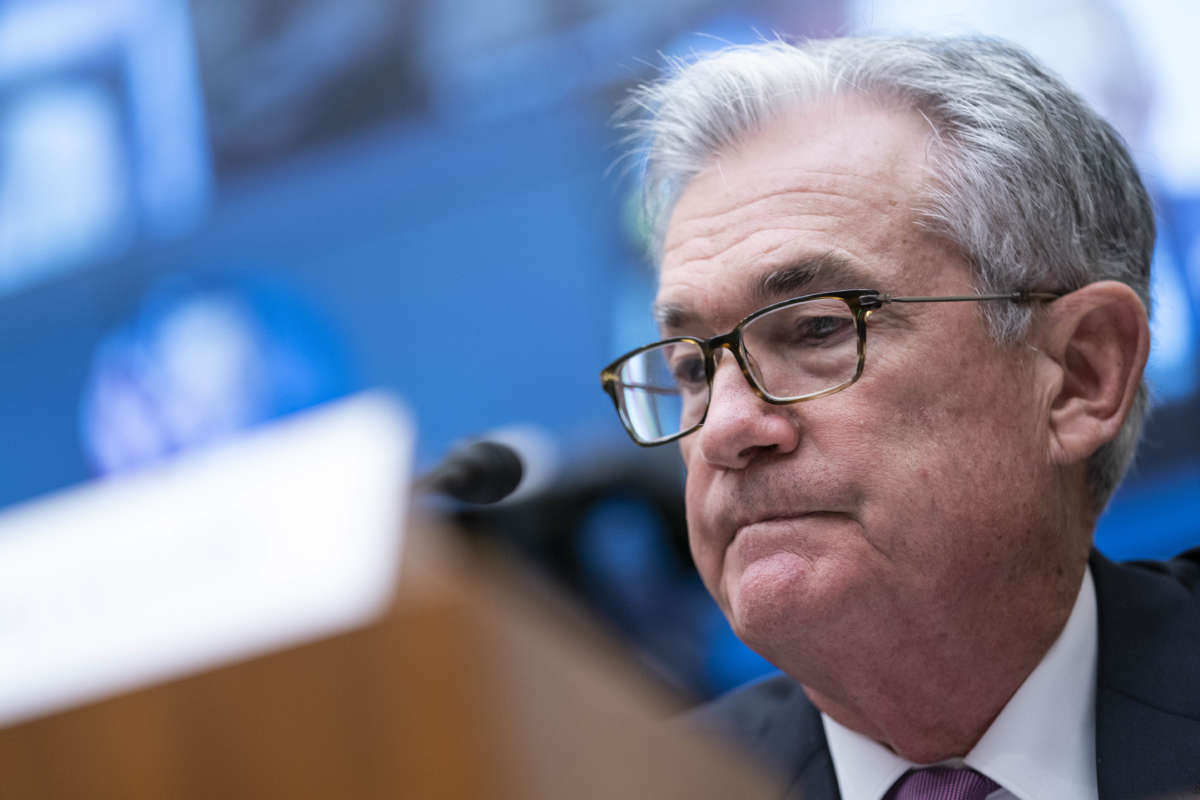Honest, paywall-free news is rare. Please support our boldly independent journalism with a donation of any size.
On Monday, the White House announced that President Joe Biden is planning to nominate Republican Jerome Powell for his second term as chair of the Federal Reserve, one of the most influential positions in Washington.
Alongside Powell, Biden will nominate Lael Brainard as vice chair. Brainard is the only Democrat on the seven-person Fed board and was previously being considered by the White House as a leading candidate to replace Powell.
The two appointments will then go to the Senate, where progressive lawmakers will likely put up a fight against Powell’s nomination — particularly Sen. Elizabeth Warren (D-Massachusetts), who has called Powell a “dangerous man” due to his record over his first four-year tenure.
Since Powell’s original nomination by Donald Trump, he has been panned by progressive advocates and lawmakers for not being strict enough when it comes to regulating banks and Wall Street. He has also been criticized for his ignorance on climate issues.
If confirmed, Powell will hold great influence over the economy during a time of rising housing prices, high inflation and instability in the labor market.
In a statement announcing the nomination, the White House noted the administration’s belief that it is important to have steady leadership at the Fed as the pandemic continues.
“Fundamentally, if we want to continue to build on the economic success of this year we need stability and independence at the Federal Reserve — and I have full confidence after their trial by fire over the last 20 months that Chair Powell and Dr. Brainard will provide the strong leadership our country needs,” said Biden. There are three remaining nominations to the Fed board that the president has yet to announce.
Progressive advocates were rooting for Brainard’s nomination as chair of the agency, citing her voting record on the Fed board, her stances supporting tougher Wall Street regulation, and her understanding that the climate crisis should be factored into the Fed’s decisions.
A handful of senators have come out against Powell’s renomination, including Senators Sheldon Whitehouse (D-Rhode Island), Jeff Merkeley (D-Oregon) and Warren. However, he will still likely be confirmed by the Senate, where he enjoys the support of conservative lawmakers like Sen. Joe Manchin (D-West Virginia).
Biden bucked progressive recommendations in nominating Powell for a second term, perhaps as an attempt to appeal to bipartisanship. That appeal may have serious consequences, as economics experts have warned that Powell’s record is alarming during an unstable time for the U.S. economy.
“[A] Powell renomination raises serious concerns simply based on his record,” Gerald Epstein wrote for Truthout in September. While Powell has rightly earned praise for his support of maximum employment and his handling of economic turmoil during the early months of the pandemic, Epstein wrote, “supporters who focus only on these areas are ignoring another crucial component of the Fed’s job — financial regulation and financial stability — where Powell has a much more problematic record.”
As Fed chair, Powell rolled back financial regulations that were put in place after the Great Recession, including Dodd-Frank, legislation that was implemented to prevent predatory mortgage lending and to curb the excessive risk-taking that led to the crisis. Many of the moves Powell made early in the pandemic were only necessary because of existing weaknesses in the financial system, Epstein noted.
The Fed has been embroiled in several scandals during Powell’s tenure — one including Powell himself. Last year, just before the stock market crashed in October, Powell sold between $1 million and $5 million in stock. Vice Chair Richard Clarida made a similar stock transaction in February of 2020, just before new pandemic policy changes were announced.
Media that fights fascism
Truthout is funded almost entirely by readers — that’s why we can speak truth to power and cut against the mainstream narrative. But independent journalists at Truthout face mounting political repression under Trump.
We rely on your support to survive McCarthyist censorship. Please make a tax-deductible one-time or monthly donation.
